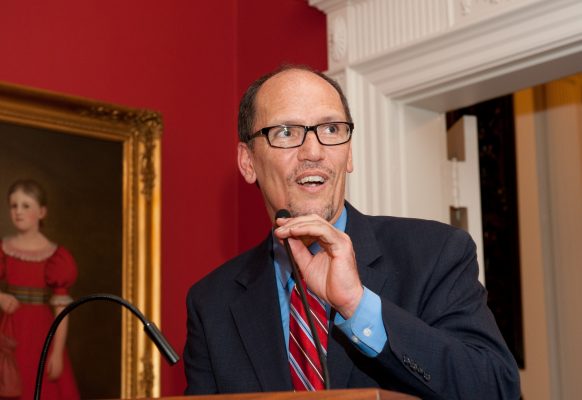Relax, No One Cares About the DNC Chair
Many have cast the DNC leadership election in the light of the wider battle between the centrist and progressive wings of the Democratic Party. (COURTESY OF MARYLAND GOVPICS VIA FLICKR)
March 9, 2017
This Saturday, members of the Democratic National Committee (DNC) convened in Atlanta to elect their new chair. There was little doubt as to the qualifications of either of the two leading candidates, former Secretary of Labor Tom Perez and Representative Keith Ellison. Both are popular within the party and have dedicated their lives to public service. That said, when Tom Perez was elected as the new DNC chair in a vote of 235-200, the reaction among many on the left was a familiar one: outrage as to why DNC had again neglected the progressive wing of the party. This is a familiar sentiment. Just last year, Bernie Sanders failed to secure the Democratic nomination, and in response, many of his supporters claimed they wouldn’t vote for Hillary Clinton, whose views they deemed too centrist.
Unfortunately, the DNC race became somewhat of a proxy war between the Sanders wing of the party and the establishment. Since Perez’s victory, the indignation professed by Ellison supporters has reached a fever pitch, which only serves to distract from the real issues Democrats face in the coming years.
Comparing the Perez-Ellison race to the Clinton-Sanders primary is a false equivalence. First of all, Perez and Ellison have far fewer policy differences than Clinton and Sanders. And second, constituents are not being asked to vote for Tom Perez. In fact, the chair of the DNC is not a figure whose name most Americans will ever even know. This is someone who does important work, but isn’t on television every day talking about it and if they are, it’s because they’ve done something wrong (see: Debbie Wasserman Schultz). The role of the chair, though integral to the well-being of the party, is not particularly sexy. It’s not a position that draws much attention, and the only reason it’s being so widely discussed now is because this race played into the persistent narrative that the Democratic Party is out of touch with its base.
Of course, this is not to suggest that the role of chair is unimportant. The chairperson is charged with a variety of tasks, but they can be boiled down to three essential responsibilities: raising money, recruiting candidates and managing the internal governance of the party. Fundraising is critical; the party needs money in order to carry out any of its aims. However, recruiting candidates is likely the most important responsibility of the DNC chair under a Trump administration. If the Democrats have any chance at regaining control of the House in 2018, the party needs to target and support strong progressive candidates. If the 2016 Democratic Primary taught us anything, it’s that Democrats need to deepen their bench. This is an area in which the Republican Party shines. The GOP has devoted significant resources to the recruitment of talented candidates, and as a result, they had sixteen candidates for the Republican nomination, while the Democrats had only four (all of whom were over the age of fifty). Since the election, this discussion of the liberal divide has become the dominant narrative surrounding the Democratic Party. For party members to argue amongst themselves over the new chair is a waste of valuable time and energy that the Democrats are in no position to be wasting. With only sixteen Democratic governors and less than one-third of state legislatures controlled by Democrats, the party is in a historically weak position. Given the struggle that Democrats face in the coming years, efforts would be better spent doing the actual work of the party, rather than arguing about which of two progressive candidates is better suited for a position that is unimportant to most Americans.
Do I think the Democrats would have been better off with Keith Ellison as chair? Sure. That said, I’m a Political Science major at a liberal arts college on the Upper West Side of Manhattan, which illustrates my point regarding the demographic that actually cares about the candidates for DNC chair. To borrow a phrase from the right, it’s the “coastal elites” in their own echo chamber who are driving this argument. In most communities, people are simply unconcerned with the results of the DNC race. We should take a cue from them.
It’s important to keep in mind that the DNC chair in itself is not a mobilizing factor for voters. What will motivate voters to turnout for Democrats, is a pool of strong candidates who show commitment to fighting for progressive issues. The Democratic Party is in a difficult situtation, but we should also keep in mind that in the presidential election, three million more people voted for the Democrat than for the Republican. All hope is not lost. What’s most important now is the recruitment of strong candidates in decisive districts, and arguing over a relatively inconsequential position does nothing to further this goal.










